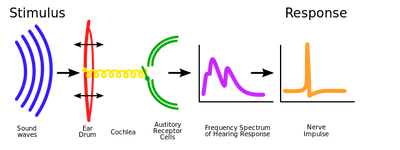Auditory PRocessing
What is
auditory processing?
Auditory Processing is a natural process of taking in sound through the ear and having it travel to the language area of the brain to be interpreted. To have a breakdown in this process is called an auditory processing disorder or “delay”. This deficit is present despite having normal hearing. Auditory processing is "what our brain does with what the ear hears". When one is faced with an auditory processing deficit, their ears can pick up the sounds, words, etc., but their brain is not able to process the sounds properly -- the auditory information becomes jumbled up or confused and therefore, misunderstood.
|
Auditory Processing Disorder (APD) may be defined as a reduced or impaired auditory processing ability to discriminate, recognize, or comprehend auditory information. This problem will be most pronounced when the auditory signals are compromised by distortion, competition, poor acoustic environments, or other reduction in signal clarity, strength, or information content.
|
In other words, the individual with APD will experience greater problems when the acoustic environment is less than ideal, such as in an open classroom or when the signal is poor due to interference, intensity, or content.

